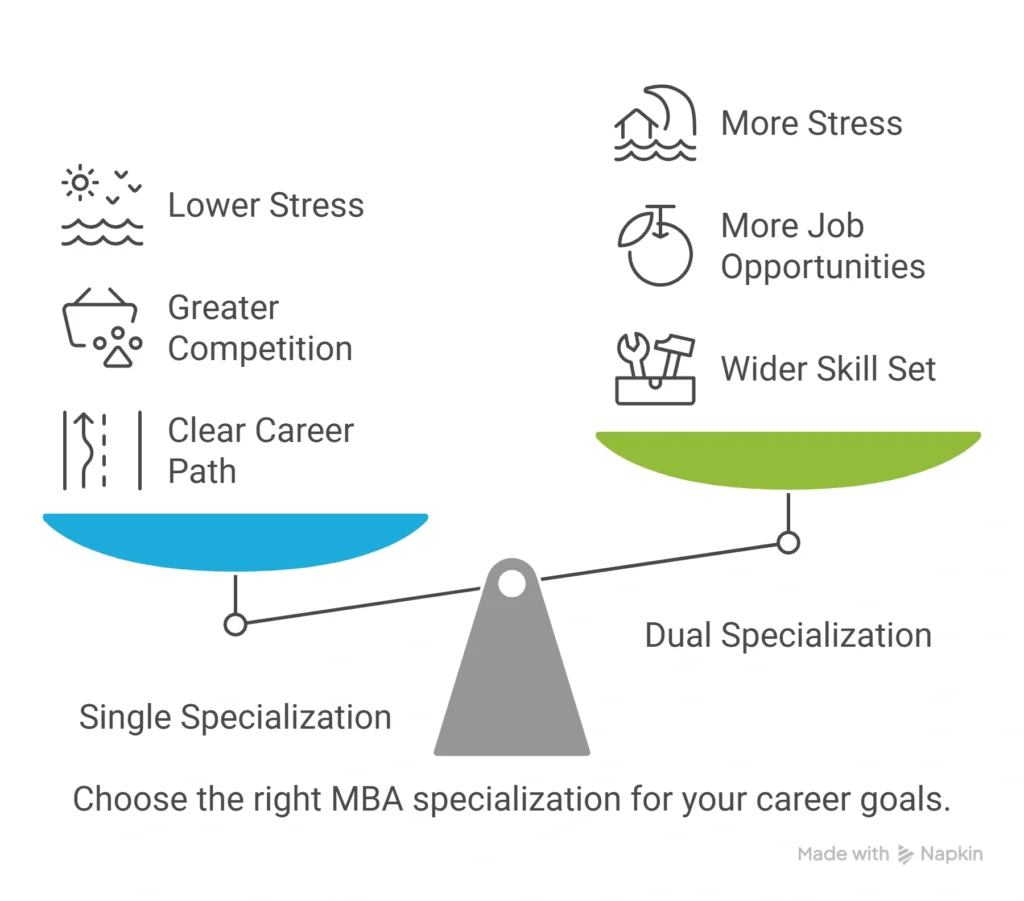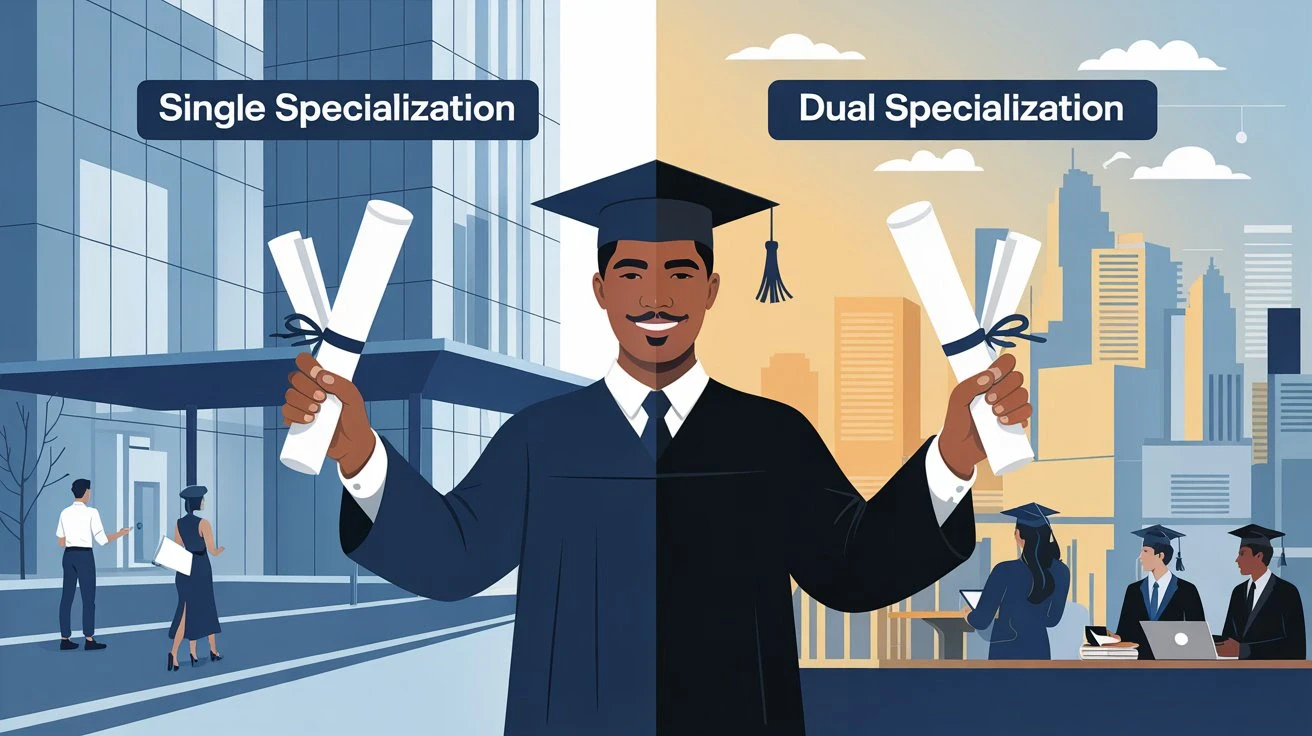Selecting the right MBA specialization is one of the most important decisions you will make, as it will help determine your career, salary package, and future opportunities. The dilemma of single vs. dual specialization is common among MBA aspirants. Each route has its pros and cons, and if you understand both paths well, you can be guided to the right one.
In this post, we will deep dive into what single specialization and dual specialization are, their pros and cons, salary aspects, career growth, and how they compare. We will also help you choose the best path based on industry trends and your personal preferences.
What is MBA Single Specialization?
Single specialization refers to committing to focus on one area of business during your MBA program. This could be marketing, finance, operations, HR, supply chain management, or IT management, among others.
By pursuing a single specialization, you can gain a strong, in-depth understanding of a specific business process. If you know exactly what you want to do in your career and are passionately pursuing excellence in a narrow specialty, single specialization may be the right choice for you.
Benefits of Focusing on One Talent:
- Specialization in One Area: You become a subject matter expert in a specific field.
- Transparent Career Path: You’ll have a clear view of your career path and how to get there.
- Quicker Career Advancement: Specializing in one area can speed up your growth in that field.
- Lower Stress: Fewer courses translate to less pressure and a more manageable workload.
Disadvantages:
- Limited Career Paths: You may have fewer career options within that particular degree area.
- Greater Competition: Due to the popularity of single specializations, you might face fierce competition in the job market.
- Relatively Low Salaries: Some single specialization careers may pay less compared to multi-specialized roles.
What is the meaning of dual specialization in an online MBA?
Dual specialization refers to specializing in two business-related subjects during your MBA studies. For instance, you might specialize in marketing & finance, HR & operations, or data science & business analytics.
Dual specialization enables you to expand your skill set and knowledge base. For those who want to be agile, flexible, and open to more opportunities, this option provides more versatility. Employers today value candidates who are skilled in multiple areas.
What is the meaning of dual specialization in an MBA?
Dual specialization refers to specializing in two business-related subjects during your MBA studies. For instance, you might specialize in marketing & finance, HR & operations, or data science & business analytics.
Dual specialization enables you to expand your skill set and knowledge base. For those who want to be agile, flexible, and open to more opportunities, this option provides more versatility. Employers today value candidates who are skilled in multiple areas.
Dual Specialization Pros and Cons:
Pros:
- Wider Skill Set: You will gain knowledge and skills in two business functions, increasing your employability.
- Increased Salary: Being knowledgeable in two fields can make you more valuable to companies, improving your salary prospects.
- More Job Opportunities: You can apply for jobs in a variety of sectors, increasing your job prospects.
- More Career Options: As a novice in the job market, dual specialization gives you the flexibility to shift from one industry or role to another.
Cons:
- More Stress: Managing two subjects means more workload, assignments, exams, and projects, which could lead to increased stress.
- Shallower Knowledge in Each Area: You may not have as deep knowledge in either of the two areas compared to someone who specializes in just one.
- Ambiguous Life Purpose: With so many options and abilities, it may be difficult to narrow down your focus and determine what you truly want to do.

Single vs Dual Specialization Salary Comparison
One of the major contrasts between single and dual specialization is the salary you earn. Here’s a breakdown of the salary ranges for both specializations based on current industry trends:
| Specialization Type | Average Starting Salary (Yearly) | Industries | Career Growth |
| Single Specialization | ₹6 LPA – ₹12 LPA | Marketing, HR, Operations, Finance, IT | Gradual expansion in one area |
| Dual Specialization | ₹8 LPA – ₹18 LPA | Sales & Marketing, Finance & HR, Operations, Data Science | Better job opportunities and earning potential |
After You Graduate, What Then?
Your specialization during your MBA will largely determine your career choices, job profiles, and the industries you can pursue. Let’s break down the post-MBA landscape for both tracks.
After MBA Single Specialization:
- Less Clarity: With just one area of expertise, you will focus on positions that demand in-depth knowledge of that specialty, such as marketing manager, financial analyst, or HR specialist.
- Straightforward Career Path: Your career path will be straightforward, allowing you to grow and advance in a specific role or industry.
- Sector-Focused Opportunities: You will have clearly defined roles in sectors that require deep expertise in your field, such as finance, marketing, or operations.
After MBA Dual Specialization:
- Diverse Opportunities: Graduates with dual specialization can work across various sectors and apply for multiple positions. For example, you can aim for roles like marketing analyst, HR business partner, or operations manager, depending on your chosen specializations.
- Greater Versatility: Specializing in two fields gives you the flexibility to transition between roles and industries seamlessly.
- Higher Salaries: The broader skill set gained from dual specializations makes these candidates more attractive to employers, leading to higher salaries.
How to Choose the Right Path?
1. Understand Your Career Goals:
- If you have a clear vision for your career, single specialization may be the better path. However, if you are still exploring options and want flexibility, dual specialization could provide more opportunities.
2. Assess Your Capacity:
- Handling the workload of dual specialization requires excellent time management. If you are comfortable managing multiple subjects and have the capacity to handle the workload, dual specialization might be the right fit.
3. Know Your Interests:
- If you are deeply passionate about a specific area and want to focus all your efforts on mastering it, single specialization is ideal. If you are curious about multiple aspects of business, dual specialization can be a great option.
4. Research the Job Market:
- Look into the industries you are interested in and identify the skills and qualifications employers are seeking. Dual specialization can make you more marketable, especially in fields like finance, tech, or consulting.
Need guidance on choosing between single or dual specialization?
Get expert advice and make an informed decision
Final Thoughts: So, Which Route to Go?
Both single specialization and dual specialization offer unique advantages, but the decision ultimately depends on your goals, interests, and capacity to manage the workload.
- Single Specialization: Ideal for students with a clear career goal who want to specialize deeply in one business function.
- Dual Specialization: Best for those seeking more job opportunities, higher salaries, and flexibility. It suits individuals who enjoy learning various aspects of business and wish to expand their skill set.
There is no one-size-fits-all solution. Your choice should be based on your career aspirations, capacity, and passion. Regardless of whether you choose single or dual specialization, focus on your personal development and professional growth to succeed in your MBA journey.
FAQ
Single specialization means focusing on one area of business, like marketing, finance, or operations. Dual specialization means studying two areas of business, like marketing & finance or HR & operations, so you have a broader skill set.
Dual specialization tends to have better salary prospects. Dual specialization graduates earn higher salaries, ₹8 LPA to ₹18 LPA, due to their broader skill set and flexibility. Single specialization salaries are ₹6 LPA to ₹12 LPA.
Yes, dual specialization is more stressful due to the extra workload and having to balance two subjects. It has more assignments, exams, and projects, which can increase stress. Single specialization has a more manageable workload.
Yes, dual specialization gives you more flexibility to switch between industries or roles. For example, someone with a marketing & finance specialization can apply for roles in marketing or finance, so more job opportunities.
Single specialization is ideal for those who have a clear vision of their career and want to be an expert in one specific area. It’s a more straightforward and focused career path, so you can go deeper in one field

Lovepreet Sachdeva is an SEO Specialist with extensive experience in helping businesses improve their online presence. He is dedicated to providing top-notch SEO services and personalized strategies to boost your website’s performance. Contact him today for professional SEO assistance.

